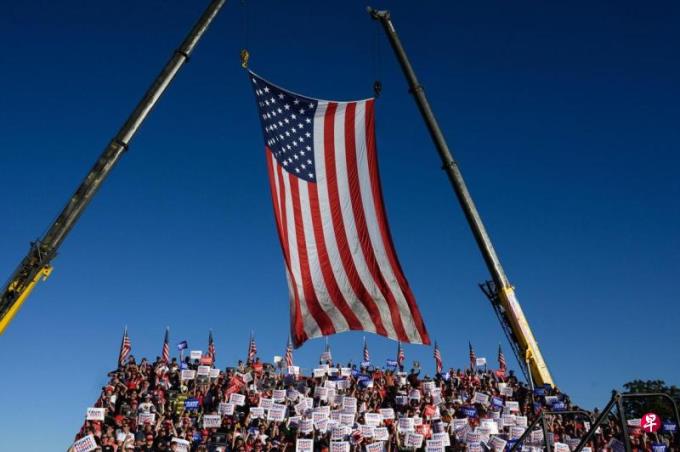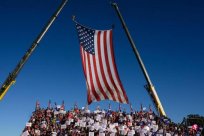
In the final analysis, the brutal reality that China must face is that it is not important who entered the White House in November.In fact, Chinese leaders do not have any fantasies to change their confrontation attitude towards China.This is better, because the two do not do so.
Perhaps nearly 4 billion people in the world voted in 2024 can be regarded as the year of election, but the most watched is the US presidential election in November this year.It is no exaggeration to say that in the current era of multiple global crises, this election is not only important for Americans, but also for other countries in the world.
Historically, important issues of US presidential elections rarely involve foreign policies.Of course, there are exceptions.The most intense Vietnamese war in 1968 was an example. The global anti -terrorist war and invasion of Iraq became another example of the focus of attention in 2004.However, in most cases, it is domestic issues (mainly economic aspects) that dominate the election debate and affect voters.
However, during this campaign, domestic and foreign issues were confused.To be sure, domestic issues are still the most important, but from the perspective of campaign remarks, they have been integrated with political discussions about China, especially how China clearly stole the employment opportunities and intellectual property rights in the United States, soTariffs and industrial policies are required.This is of course not good news for Beijing, as well as free trade and globalization.
Policy for China: continuity is greater than changes?
So, how will Trump and Harris, the protagonists in the latest political drama in the United States, do how to cope with Chinese challenges?
As far as former President Trump is concerned, we can see some clues from his four years.During the ruling, the Trump administration carefully lay out a policy to turn sharply, deviating from the cautious and optimistic attitude towards China at that time, and turned to competition.
The government of Trump is full of the Hawkeye. They are more willing to consider the economic interdependence as the main source of friction. As a result, the trade war broke out first, and then caused a scientific and technological war.During this period, Trump's arrogant and tough position on China did not seem to care about this method that would cause the bilateral relationship to deteriorate sharply.
Trump is not an isolated man that some people do. In fact, he pays attention to the Asia -the Pacific, including renamed it to India -Pacific.Quote China.Regional security allies and partners welcomed the United States with a stronger attitude, but at the same time, the trading methods of Trump's sixth relatives made them deeply disturbed.
Trump is famous for repeated impermanence during his presidency, but one thing is consistent: he hates the trade deficit.Therefore, if Trump returns to the White House, it can be certain that he will be surrounded by the Hua Eagle School that is firmly advocated by tariffs.In fact, some people who had worked in the Trump government before and did not make trouble with him were already moving.
To predict the Harris government's policy of China, you must first understand what she will inherit from President Biden.After all, he is her current boss.
It is worth noting that the current Democratic government's policy of China not only abandoned the policy of inheriting the Trump administration, but also President Biden and his team accelerated the implementation of these policies and fine -tuned it.U.S. Secretary of State Broskere put forward this policy in the early days of the Bayeng government. He described the US policy as "competing for competition, cooperating when cooperating, and confrontation when you must fight."
One of the main differences between Bayeng and the Trump administration is that the former is more inclined to actively active diplomacy and establish international partnerships. It is expected that Harris will do this.Trump likes to handle global affairs in a transaction and unilateralist way, while Bayeng has strengthened the security dialogue between the Quartet (fair speaking, this mechanism was restarted by the Trump administration), deepened the cooperation between Japan and South Korea and the United States, strengthened the cooperation of three sides of Japan and South America, strengthened, strengthened the cooperation of Japan and the United States, strengthened, strengthened, and strengthened.The defense relationship with the Philippines, as well as the launch of the three -sided security partnership (AUKUS), which initiates Australia, Britain, and the United States, is committed to establishing partnership with AIA and allies.
At the same time, Biden also introduced a targeted "small courtyard high wall, de -risk risk" policy, which mainly focuses on restricting China's advanced semiconductor technology and equipment, but it is also designed to revitalize the key departments of the American industry and economic departments.Reduce the strategy of strengthening industrial policies such as Inflation Reduction Act and chip bills (Chips Act).
What did the candidate say so far
No matter who is elected, we are likely to find that there will be no great changes in the substantive content of China policy.At the same time, both candidates have made some vague remarks that may indicate future policy directions, but when interpreting these remarks, it is best to be cautious.
In the Republican Party, Trump has criticized the development of Taiwan's manufacturing industry to harm the interests of the United States, so it is necessary to let these jobs return to Americans.Both Trump and his vice presidential candidate insist that allies should bear greater responsibilities for their national defense.Trump also further suggested that in addition to levying 10%of tariffs on all foreign imported goods, 60%of tariffs on China must be imposed.However, in the sound of clamor, we should remember the fact that the US trade deficit with China has actually expanded during Trump's ruling.
Harris, as Vice President, work under the current president of international foreign affairs, has less contact with foreign policy than people think.In fact, in terms of foreign policy, she is currently only thinking about keeping a distance from the Evil War; this war has caused a serious humanitarian crisis in Gaza, and it may bring her major problems in China.Ironically, a few days after Bayndon announced his withdrawal from the Presidential election in 2024, Harris met with the Israeli Prime Minister Neyahu; this was the first time that she had held an important meeting with foreign leaders after the development of the situation.
The reality that China must face
On the Chinese issue, in addition to roughly talking about China's intellectual property theft and the necessity of adopting the "de -risk" approach, there are almost no other remarks in this regard.Nevertheless, it must be pointed out that as Vice President, she faithfully followed Bayon's policy framework for China.Another point is worth considering that her campaign partner Waltz is familiar with China.He taught in Guangdong in 1989, and later led the student delegation to visit China.
Optimists will think that this familiarity and experience may play a subtle role when dealing with China, and this is exactly what Wans lacks.However, it is worth noting that this personal experience is nothing new in the political field.After all, there is almost no evidence that the Chinese President Xi Jinping spent the weeks in Aiwa in 1985, which has any impact on how he views or handle the relationship with the United States.
In the final analysis, the brutal reality that China must face is that it is not important who entered the White House in November.In fact, Chinese leaders do not have any fantasies to change their confrontation attitude towards China.This is better, because the two do not do so.But at least recognize this, it is expected to allow the two countries to find a solid guardrail in the next four years to have more realistic views on what can be or not.
Author Joseph Chinyong Liow is a senior research consultant, humanities, arts and social sciences, dean of the Academy of Highernary/P"
The English Electronics Magazine "ThinkChina" (ThinkChina "
Golden Shun Translation




